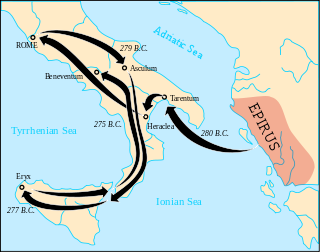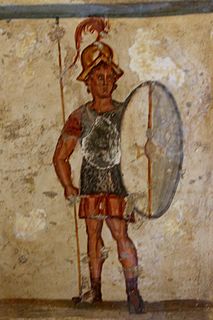
This article concerns the period 289 BC – 280 BC.
Year 280 BC was a year of the pre-Julian Roman calendar. At the time it was known as the Year of the Consulship of Laevinus and Coruncanius. The denomination 280 BC for this year has been used since the early medieval period, when the Anno Domini calendar era became the prevalent method in Europe for naming years.

Demetrius I, called Poliorcetes, son of Antigonus I Monophthalmus and Stratonice, was a Macedonian nobleman, military leader, and finally king of Macedon. He belonged to the Antigonid dynasty and was its first member to rule Macedonia.

A Pyrrhic victory is a victory that inflicts such a devastating toll on the victor that it is tantamount to defeat. A Pyrrhic victory takes a heavy toll that negates any true sense of achievement or damages long-term progress.

Pyrrhus was a Greek king and statesman of the Hellenistic period. He was king of the Greek tribe of Molossians, of the royal Aeacid house, and later he became king of Epirus. He was one of the strongest opponents of early Rome, and regarded as one of the greatest generals of antiquity. Several of his victorious battles caused him unacceptably heavy losses, from which the term "Pyrrhic victory" was coined.

The gens Valeria was a patrician family at ancient Rome, prominent from the very beginning of the Republic to the latest period of the Empire. Publius Valerius Poplicola was one of the consuls in 509 BC, the year that saw the overthrow of the Tarquins, and the members of his family were among the most celebrated statesmen and generals at the beginning of the Republic. Over the next ten centuries, few gentes produced as many distinguished men, and at every period the name of Valerius was constantly to be found in the lists of annual magistrates, and held in the highest honour. Several of the emperors claimed descent from the Valerii, whose name they bore as part of their official nomenclature.

The Battle of Heraclea took place in 280 BC between the Romans under the command of consul Publius Valerius Laevinus, and the combined forces of Greeks from Epirus, Tarentum, Thurii, Metapontum, and Heraclea under the command of Pyrrhus, king of Epirus. Although the battle was a victory for the Greeks and their casualties were lower than the Romans, they had lost many veteran soldiers that would be hard to replace on foreign soil.

The Battle of Asculum took place in 279 BC between the Roman Republic under the command of the consuls Publius Decius Mus and Publius Sulpicius Saverrio, and the forces of King Pyrrhus of Epirus. The battle took place during the Pyrrhic War, after the Battle of Heraclea of 280 BC, which was the first battle of the war. There exist accounts of this battle by three ancient historians: Dionysius of Halicarnassus, Plutarch, and Cassius Dio. Asculum was in Lucanian territory, in southern Italy.

The Pyrrhic War was largely fought between the Roman Republic and Pyrrhus, the king of Epirus, who had been asked by the people of the Greek city of Tarentum in southern Italy to help them in their war against the Romans.
Acrotatus was an Agiad King of Sparta from 265 to 262 BC. He was the son of Areus I, and grandson of Acrotatus I.

The Battle of Beneventum was the last battle of the Pyrrhic War. It was fought near Beneventum, in southern Italy, between the forces of Pyrrhus, king of Epirus in Greece, and the Romans, led by consul Manius Curius Dentatus. The result was a Roman victory and Pyrrhus was forced to return to Tarentum, and later to Epirus.
Obsidius was the commander of a Frentanian troop of horse, serving under the consul Laevinus in the campaign against Pyrrhus in 280 BC. He distinguished himself in the battle fought at the river Liris in that year by the daring attempt which he made upon the king's life. He unhorsed Pyrrhus but was killed by the personal attendants of the king.
Chilonis was a Spartan princess, daughter of Leotychidas, wife of Cleonymus and mother of Areus II. She is known from Plutarch's "Life of Pyrrhus".
Marcus Valerius Laevinus was a Roman consul and commander who rose to prominence during the Second Punic War and corresponding First Macedonian War. A member of the gens Valeria, an old patrician family believed to have migrated to Rome under the Sabine king T. Tatius, Laevinus played an integral role in the containment of the Macedonian threat.
Tiberius Coruncanius was a consul of the Roman Republic in 280 BC. As a military commander in that year and the following, he was known for the battles against Pyrrhus of Epirus that led to the expression "Pyrrhic victory". He was the first plebeian Pontifex Maximus, and possibly the first teacher of Roman law to offer public instruction.

The siege of Sparta took place in 272 BC and was a battle fought between Epirus, led by King Pyrrhus, and an alliance consisting of Sparta, under the command of King Areus I and his heir Acrotatus, and Macedon. The battle was fought at Sparta and ended in a Spartan-Macedonian victory.

The Antigonid Macedonian army was the army that evolved from the ancient Greek kingdom of Macedonia in the period when it was ruled by the Antigonid dynasty from 276 BC to 168 BC. It was seen as one of the principal Hellenistic fighting forces until its ultimate defeat at Roman hands at the Battle of Pydna in 168 BC. However, there was a brief resurgence in 150-148 during the revolt of Andriscus, a supposed heir to Perseus.

Quintus Fabius Maximus was a consul of the Roman Republic in 213 BC. He was the son of Quintus Fabius Maximus Verrucosus, the famous dictator who invented Fabian strategy, and served with his father during the Second Punic War.

Pyrrhus' invasion of the Peloponnese in 272 BC was an invasion of south Greece by Pyrrhus, King of Epirus. He was opposed by Macedon and a coalition of Greek city-states (poleis), most notably Sparta. The war ended in a joint victory by Macedonia and Sparta.
The gens Opsidia or Obsidia was an obscure plebeian family at ancient Rome. Few members of this gens are known to have held any magistracies, but several are found in inscriptions. One Obsidius gave his name to the volcanic glass obsidian.








